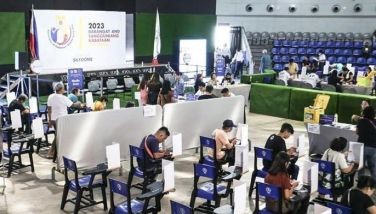Parochial

I am not too comfortable with the plan to return to the old school year that begins in June. But the decision appears to have been taken.
On the basis of consultations, parents complained about sending their children to crowded classrooms in the hottest months of the year. That is not irremediable, of course. But it will take a sum we cannot currently afford to install climate controls in our school buildings.
The decision to move the start of school to late August or September was part of a larger scheme to synchronize our educational system with the rest of the world. Most countries operate on this schedule.
Filipino children, when they have to relocate to another country, are penalized by the loss of a year’s schooling. Too, with modern communication technologies, it should be possible to imagine cross-border schooling, with our students taking online courses with institutions abroad. Distance learning is quickly becoming the norm.
If it were not for that flawed constitutional provision restricting foreign educational institutions from setting up educational facilities here, we should have seen a flowering of educational joint ventures such as they have in neighboring countries. This would have enriched our educational offerings, attuned us to international standards and exposed our students to a more global schooling experience.
Some years ago, I became acquainted with a European group looking into the possibility of establishing a base here for producing television-based educational programs for all of Asia. It was a wonderful idea. It would create employment for thousands of our artists and educators.
But that idea was unconstitutional on two counts. Foreigners cannot own media establishments. They cannot invest in something that looks like an educational facility. The 1987 Constitution wanted to keep our people inward-looking.
Since that time, Korean pop and telenovelas rose to the prominence they enjoy now. Nothing affirms that nation’s culture more than the capacity of its economy to export its cultural creations.
By contrast, artistic production withered in this country, weighed down by a constitutional order that commands us to be inward-looking. We cannot export anything beyond bananas because our political economy is autarkic.
The decision to synchronize our school year with the rest of the world was a step towards internationalizing our education – and, by extension, our cultural production. It goes in tandem with the decision to add years to our secondary school program to match global standards.
Now we are moving backwards. Not only is the school year being adjusted back to what it was before, there is also mounting pressure to review the K-12 curriculum.
If our educational officials yield on the demand to shorten the K-12 program, that would be another step backwards. Our students will be lesser trained than their counterparts elsewhere. They will be less competitive. This will only worsen the fact that our basic education is turning a learning deficit.
In survey after survey, our students rank at the bottom in all areas of competence – from literacy to numeracy. This is not the top-caliber workforce need for the country to thrive in a globalized world.
How many able-bodied young Filipinos work as security guards?
I dare not count. It is a staggering amount of youth and talent wasted peeking into other people’s handbags. Yet, to be employed as security guard, two years of college is required.
Parents complain that the K-12 program adds to the cost of educating their children. But the whole point of building a strong senior high school curriculum is to make the child employable without having to go to college.
Maybe our decrepit educational system has failed to live up to that goal. But that is not a reason to stop trying.
We failed to accomplish certain things that might have brought our educational system up to grade. We have not solved the classroom shortage. This is the reason why our class sizes are too large and teaching effectiveness is constrained.
As our population becomes more urbanized, there is less land available for schools. This is why our elementary schools have become high-rises and students are forced into unholy shifts, the first one starting too early and the last one ending too late. This takes a larger toll on the wellbeing of our young and their ability to learn.
I was disheartened to hear some of our legislators say that basic education should continue to be reserved for Filipino investors even if the other restrictive economic provisions are liberalized. They fear that internationalizing our educational system will lead to a loss of “Filipino values” and, eventually, to loss of national identity.
This is such a parochial attitude. Schools are not supposed to serve the propaganda goals of fostering nationalism. They are there to teach skills, build citizens who are functional in every workplace. Knowing the multiplication table will be vastly more useful for the nation than knowing how many girlfriends Jose Rizal had.
All in all, it seems parochialism is now getting the upper hand in the formation of our educational policy. This will be self-defeating in the long run.
What do Filipinos do during the hottest months of April and May? They crowd the beaches to get more sun.
We may be past the decision point on this. But maybe we should have chosen to buy more electric fans and have smaller classes to help them thrive in the classroom instead of moving back the school year.
- Latest
- Trending
























